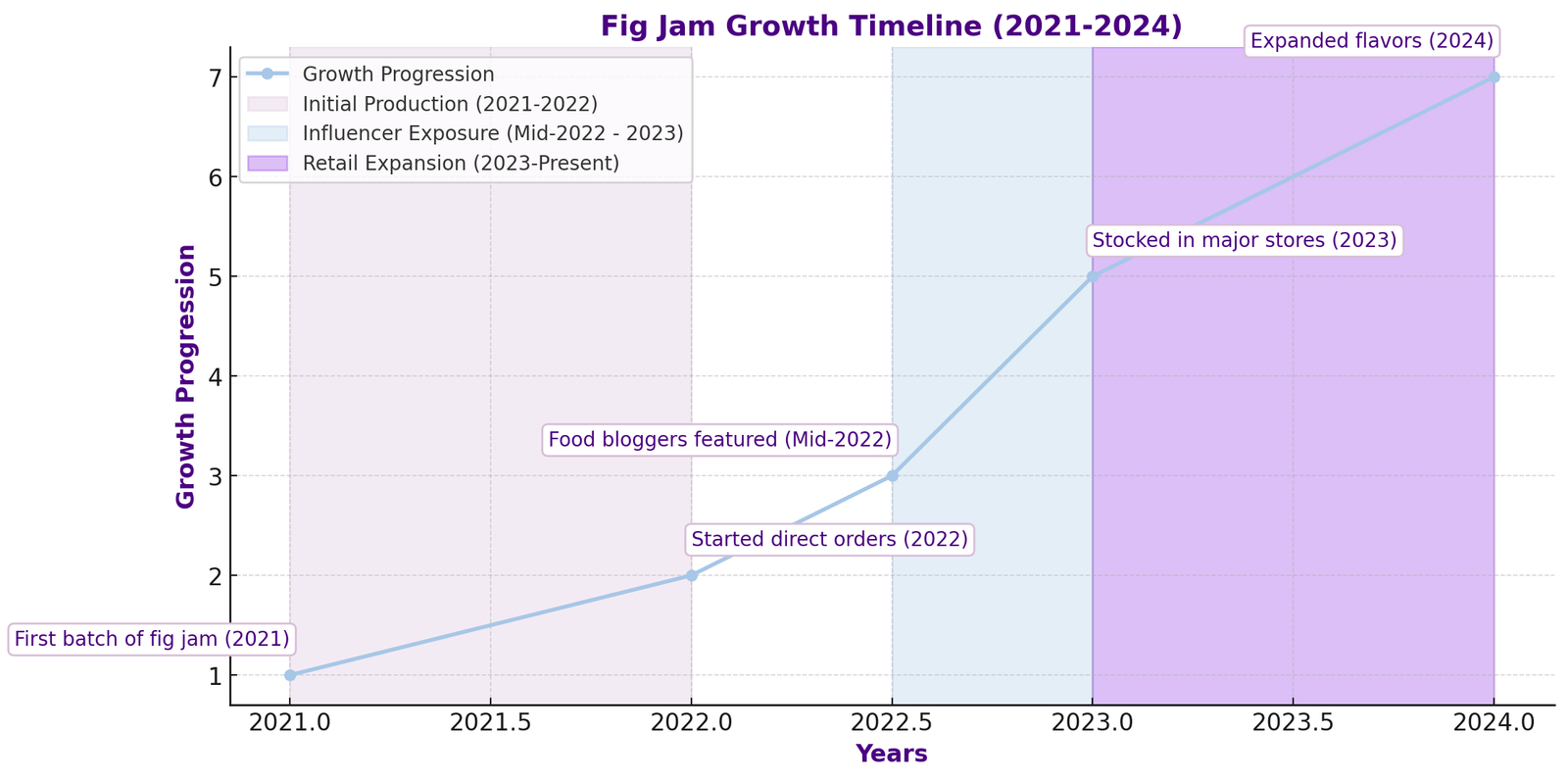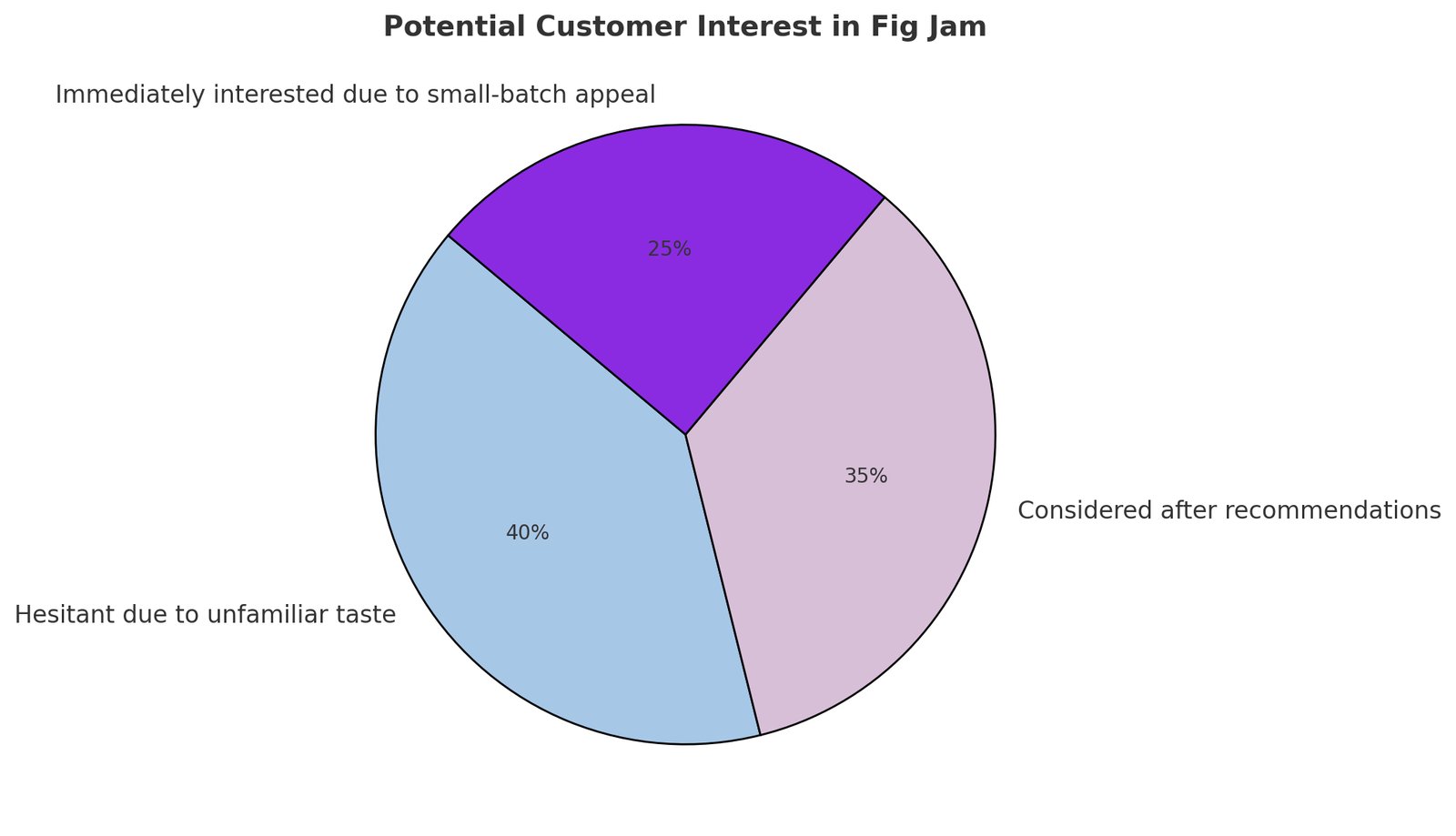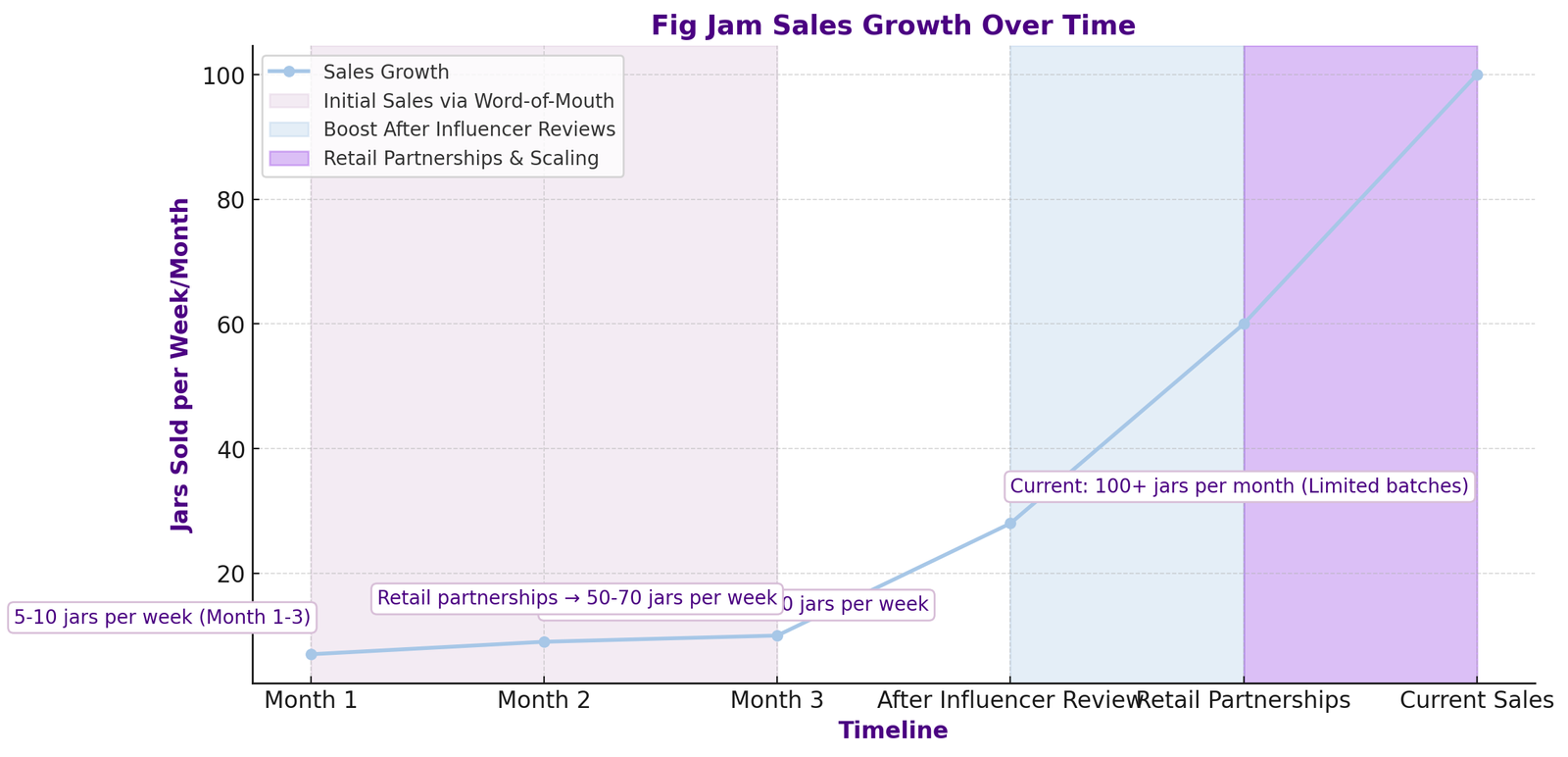A Niche Waiting to Be Owned
"Sometimes, the best business ideas are hidden in plain sight right in your backyard."
Great businesses don’t always start with a groundbreaking idea. Sometimes, they start with a simple moment of discovery an experience so personal, yet so powerful, that it plants the seed of a future venture. For Shahid, that moment happened in a small Cypriot kitchen, decades before IL Capo Preserves ever existed.
As a boarding school student in England, he visited his Greek Cypriot roommate’s home and tasted something he had never encountered before homemade fig jam. It wasn’t the synthetic, mass-produced spreads he had grown up seeing. It was fresh, rich, and deeply tied to tradition. That taste stayed with him.
Years later, back home in Lahore, he noticed something that most people overlooked fig trees growing in his own backyard. He had always loved figs, but now, staring at an abundance of fruit with no clear purpose, he felt a familiar spark.
"What if I tried making fig jam?"
At first, it was just an experiment. He made a few jars for himself, his family, and close friends. Then something unexpected happened:
- People didn’t just like itthey loved it.
- They asked for more.
- They wanted to buy it.
There was just one problem fig jam wasn’t a common product in Pakistan. Unlike strawberry or mixed fruit jams, there was no existing market for it. But instead of seeing that as a roadblock, Shahid saw an opportunity.
"If no one else is making fig jam, that means no one else is competing for this market."
He wasn’t just selling jam he was introducing Pakistan to a new flavor, a new experience, a new product category.
That’s how IL Capo Preserves was born. Not as just another brand in an overcrowded industry, but as a pioneer in a market no one else was serving.
From Challenges to Breakthroughs
"In the middle of every challenge lies an opportunity if you know where to look."
Every new business faces hurdles, but for a niche product like IL Capo Preserves, the obstacles were even greater. The Pakistani market was already filled with well-established jam brands, making it nearly impossible for a new entrant to compete. Yet, instead of battling for market share in a crowded space, Shahid decided to introduce something completely different: a handcrafted fig jam with no artificial flavors, no mass production, and no direct competition.
This decision, while strategic, came with its own set of challenges. People were unfamiliar with the product, hesitant to try something they had never tasted before. Without a factory or large-scale production capabilities, Shahid had to rely on small-batch manufacturing, which many would see as a limitation. With no marketing budget, he had to find ways to create visibility without spending on traditional advertising. Even getting his product into stores was a challenge, as retailers were reluctant to stock an unknown, unconventional jam.
Yet, at every stage, Shahid found a way to turn these barriers into competitive advantages. He understood that being different wasn’t a weakness it was his greatest strength. By positioning IL Capo Preserves as an exclusive, premium product, he built a brand that thrived not despite its challenges, but because of them.

2021: First batch of fig jam made using figs from Shahid’s backyard.
2022: Started supplying fig jam to friends and family through direct orders.
2022 (mid-year): Sent samples to food bloggers; Bhindi Fries & Butterfingers posted about it.
2023: Got stocked at Baked (Lahore), Fresh Basket (Karachi), and G&S (Islamabad).
2024: Expanded flavors to include strawberry jam and marmalade while maintaining the small-batch model.
Winning Over a Market That Didn’t Exist
Fig jam was not a common product in Pakistan. While people were familiar with fruit jams like strawberry and mango, figs had always been seen as either a dried fruit or an ingredient in traditional home remedies. The idea of using them in a jam was unfamiliar, and many potential customers were unsure if they would even like the taste.
Shahid knew that no amount of branding or advertising could convince people to buy something they weren’t sure about. Instead of trying to sell the product outright, he focused on getting people to experience it first. He personally handed out samples to friends and family, encouraging them to share their thoughts. He sent jars to micro-influencers in the food space, knowing that an honest review from someone people trusted would have more impact than any paid campaign.
One of his early breakthroughs came when Bhindi Fries and Butterfingers, two well-known food bloggers, tried his jam and shared their reviews online. Their audiences, already inclined toward discovering unique food experiences, took notice. As people started hearing about IL Capo Preserves from sources they trusted, curiosity grew. What had once been an unfamiliar product now felt like something worth trying. The hesitation that had been his biggest obstacle turned into an opportunity, as customers were drawn to the idea of tasting something new and exclusive.
40% of potential customers were hesitant to try fig jam because they were unfamiliar with the taste.
35% only considered purchasing after seeing recommendations from influencers or friends.
25% immediately expressed interest due to the handcrafted, small-batch positioning.

Scaling Without a Factory
For most food businesses, expansion is tied to mass production. Large-scale manufacturing helps bring down costs, increase output, and meet growing demand. But Shahid had neither the resources nor the desire to take this approach. Instead of trying to compete with industrial food brands, he decided to embrace small-batch production as a strength rather than a weakness.
Rather than positioning IL Capo Preserves as an everyday supermarket jam, he framed it as a premium, artisanal product something made in limited quantities with care and precision. His customers weren’t just buying jam; they were buying into a brand that stood for quality, authenticity, and craftsmanship.
The absence of mass production became a key selling point. Every jar was handmade, using fresh, high-quality ingredients with no artificial preservatives or additives. Customers who cared about what they consumed appreciated this difference. Instead of trying to lower his price to compete with big brands, Shahid was able to charge a premium for a product that felt exclusive and rare.
By staying committed to small-batch production, he ensured that quality remained his priority. The demand grew, but instead of rushing to expand, he continued making only as much as he could maintain at the highest standard. This approach not only strengthened the brand’s identity but also created a sense of exclusivity—when something is available in limited quantities, people want it even more.
Marketing Without a Budget
In a world where food brands spend millions on advertising, IL Capo Preserves had no marketing budget. There were no television commercials, no sponsored billboards, no digital ad campaigns. Competing against established brands in this space seemed impossible. But Shahid understood that the most powerful marketing tool wasn’t an ad it was people’s trust.
Instead of traditional promotions, he focused on word-of-mouth marketing. He encouraged every customer to share their experience, whether through a simple conversation or a social media post. Each time someone shared a picture of their jam on Instagram, it reinforced the brand’s authenticity. Potential customers didn’t see IL Capo Preserves through polished advertisements; they saw it in the homes of real people who genuinely loved the product.
This organic growth strategy proved to be far more effective than paid marketing. Instead of trying to convince people with sales tactics, he let satisfied customers do the marketing for him. As more people talked about the jam, demand grew without Shahid having to spend a single rupee on advertising.
Getting Retailers to Take a Chance on an Unknown Brand
Getting shelf space in established grocery stores is a major challenge for any new food brand. Supermarkets prioritize products with strong brand recognition and guaranteed sales. For a niche, homemade product like fig jam, breaking into retail seemed nearly impossible.
Rather than attempting to compete with big-name brands in traditional supermarkets, Shahid took a different approach. He focused on getting his product into the right stores, not the biggest stores.
Instead of targeting large retail chains, he approached Baked in Lahore, Fresh Basket in Karachi, and G&S in Islamabad stores known for carrying high-quality, curated food products. He positioned his jam not as a competitor to the mass-market brands they already stocked, but as a specialty product that would set them apart from competitors.
By aligning with stores that catered to customers looking for premium, unique food items, Shahid was able to place IL Capo Preserves in locations where it would naturally attract interest. These were not just distribution points; they were platforms that reinforced the brand’s exclusivity and authenticity.
His pitch to retailers wasn’t about competing with existing products it was about offering something they didn’t already have. This exclusivity worked in his favor. Store owners saw the value in carrying a unique, handcrafted product that no other brand was offering.
Turning Challenges Into Strengths
Shahid’s journey with IL Capo Preserves is proof that success doesn’t come from avoiding challenges it comes from knowing how to turn them into advantages. Each obstacle he faced became an opportunity to refine his approach, strengthen his brand identity, and connect with customers in a meaningful way.
Instead of struggling to compete in a crowded market, he built a niche where there was no competition. Instead of expanding too quickly and losing quality, he embraced small-batch production as a strength. Instead of relying on expensive advertising, he let his customers market for him. Instead of fighting for space in supermarkets, he chose retail partnerships that aligned with his brand.
By making these strategic decisions, IL Capo Preserves didn’t just survive it thrived. And in doing so, Shahid proved that being different is not a disadvantage. In a world where businesses fight to be bigger, sometimes the best strategy is to be bolder.
Scaling with Precision and Purpose
"Success isn’t just about finding a great idea it’s about knowing how to make it grow while staying true to its essence."
For many businesses, scaling means mass production, aggressive advertising, and rapid expansion. But IL Capo Preserves wasn’t built to compete with conventional brands it was built to stand apart. From the beginning, Shahid understood that owning a niche required a different approach to growth. He didn’t just want to sell jam; he wanted to sell a premium experience, something that felt authentic, exclusive, and irreplaceable.
Every decision he made reflected this philosophy. Instead of trying to dominate supermarket shelves, he positioned IL Capo Preserves as a specialty product that belonged in curated, high-end stores. Instead of spending on paid advertising, he let his customers and community do the marketing for him. Instead of scaling too fast and risking quality, he remained committed to small-batch production, ensuring that every jar stayed true to the original vision.
By embracing these principles, IL Capo Preserves didn’t just grow it became a brand with a devoted following. Here’s how Shahid scaled his business without sacrificing what made it unique.
First 3 months: Only 5-10 jars sold per week via word-of-mouth.
After Bhindi Fries & Butterfingers’ review: Sales doubled, with 25-30 jars per week sold.
Retail partnerships (Baked, Fresh Basket, G&S): Sales scaled to 50-70 jars per week, driven by in-store discovery and organic word-of-mouth.
Current sales volume: Shahid produces limited batches of 100+ jars monthly, maintaining exclusivity.

1. Positioning: Selling More Than a Product—Selling an Experience
Niche brands don’t compete on price they compete on value. From day one, Shahid knew that IL Capo Preserves couldn’t be marketed as just another jam. It had to stand for something bigger: quality, craftsmanship, and exclusivity.
He made sure the branding reinforced this idea. The labels were kept sleek and minimalist, reflecting a product that belonged in gourmet kitchens rather than supermarket aisles. The messaging was clear: handcrafted, small-batch fig jam no artificial flavors, no mass production. The lack of preservatives wasn’t just a detail; it was part of the brand’s identity, appealing to customers looking for something authentic, something real.
This approach worked. Customers weren’t just buying fig jam; they were buying into a story, a tradition, and a rare culinary experience. The limited production only added to its appeal if something is hard to find, people value it more. By positioning IL Capo Preserves as an artisanal, exclusive product, Shahid didn’t have to compete with commercial brands. He created a category of his own.
2. The Right Stores, Not Every Store
Most food brands dream of being stocked in as many retail locations as possible, but Shahid took a different route. Rather than approaching every grocery store in Pakistan, he focused on selective partnerships with premium stores that shared his brand’s values.
He strategically placed IL Capo Preserves in Baked (Lahore), Fresh Basket (Karachi), and G&S Store (Islamabad) not just as another item on the shelf, but as a curated product that aligned with these stores’ reputations for carrying high-quality, specialty goods.
His pitch to retailers wasn’t about competing with other jams it was about offering something unique that their customers couldn’t find anywhere else. He framed it as an elevated product, one that deserved a place in gourmet stores rather than mass-market chains.
This decision did more than just secure shelf space it solidified IL Capo Preserves as a premium brand. By being selective about distribution, Shahid reinforced the idea that his jam wasn’t for everyone it was for those who appreciated the finest ingredients and handcrafted quality.
3. Letting Customers Market the Brand
Without a marketing budget, most businesses struggle to gain visibility. But Shahid saw an opportunity where others saw a limitation. Instead of spending on advertisements, he turned his customers into his marketing team.
Each time he sent a jar to family, friends, or early customers, he asked them to send pictures and share their experiences. It was a simple request, but it made a huge impact. People were excited to be part of something special, and their personal endorsements carried more weight than any paid promotion ever could.
When customers posted about IL Capo Preserves on Instagram, it didn’t feel like advertising it felt like a genuine recommendation from a trusted friend. Food bloggers and influencers, drawn to the authenticity of the brand, began featuring it in their content. Every new post created curiosity, and curiosity led to demand.
This organic strategy allowed the brand to grow without a single rupee spent on advertising. The more people shared, the more valuable the brand became. Customers didn’t just buy the jam they became part of its story.
Scaling with Purpose
IL Capo Preserves grew not by following traditional business tactics, but by staying true to what made it unique. It wasn’t just about expansion it was about expanding the right way. By focusing on positioning, strategic retail partnerships, and customer-driven marketing, Shahid proved that owning a niche is the most powerful way to scale.
His journey challenges the idea that success is about reaching the masses. Sometimes, the best path to growth is not about being everywhere it’s about being in the right places, with the right customers, at the right time.
Turning a Niche into a Lasting Success
"A business built on differentiation doesn’t just compete it redefines the market."
As IL Capo Preserves grew, Shahid’s strategic decisions turned his niche product into a recognizable, in-demand brand. What started as a simple experiment with fig jam evolved into a business with a distinct identity, loyal customers, and a strong retail presence. His ability to position his brand strategically, leverage organic marketing, and maintain quality without mass production set IL Capo Preserves apart in an industry dominated by large-scale food manufacturers.
This success was not accidental. It was a direct result of Shahid’s ability to see challenges as opportunities and turn limitations into strengths. By staying committed to his vision of authenticity and exclusivity, he built a brand that thrived without following conventional business models.
1. Differentiation as a Competitive Advantage
Instead of trying to compete with established jam brands, Shahid created an entirely new category. The absence of fig jam in Pakistan was not a weakness it was an opportunity to own a niche that no other brand had claimed. This decision eliminated the need for price wars, heavy advertising, or fighting for visibility.
By presenting IL Capo Preserves as a specialty product rather than a mass-market commodity, Shahid ensured that his brand was perceived as something unique and worth seeking out. Customers weren’t just buying jam they were buying into an exclusive, handcrafted experience.
This approach is a powerful lesson for entrepreneurs: competing in an existing market is one path to success, but owning an unclaimed space eliminates the competition altogether.
2. The Profitability of Small-Batch, Handmade Products
Many food entrepreneurs believe that scaling requires large-scale manufacturing, but IL Capo Preserves proved otherwise. By keeping production small and focused on quality over quantity, Shahid was able to charge premium prices for a handcrafted product that consumers valued.
Customers today are increasingly drawn to authentic, natural, and ethically made products, and Shahid’s commitment to small-batch production became a selling point rather than a limitation. Instead of trying to lower his costs by increasing volume, he maintained an artisanal process that guaranteed freshness and superior taste.
The success of IL Capo Preserves demonstrates that profitability isn’t just about selling more it’s about selling smarter. High-quality, niche products can command higher prices and create stronger customer loyalty than mass-produced alternatives.
3. Word-of-Mouth Marketing as a Growth Engine
Shahid’s success without a formal marketing budget challenges the notion that businesses need expensive advertising to grow. While larger food brands relied on aggressive promotions, IL Capo Preserves expanded through organic, community-driven marketing.
The brand’s visibility grew through social proof customers sharing their experiences, influencers posting genuine reviews, and retailers recognizing its value. This method not only saved costs but also built a more loyal and engaged customer base.
IL Capo Preserves’ journey highlights a crucial insight: a product that is truly different will naturally generate conversation. When people encounter something unique, they talk about it. This organic momentum can be far more effective than paid marketing, especially for niche brands.
4. Choosing the Right Retail Partners Over Mass Distribution
Rather than trying to get his product onto every supermarket shelf, Shahid was selective about where IL Capo Preserves was stocked. By partnering with premium stores like Baked, Fresh Basket, and G&S, he ensured that his brand was placed in an environment that complemented its exclusivity.
This approach not only positioned IL Capo Preserves as a high-end product but also protected its brand image. Instead of competing with lower-cost jams in mainstream grocery stores, the brand was showcased in carefully curated retail spaces where customers were already seeking premium, artisanal goods.
For entrepreneurs, this highlights the importance of strategic distribution. Being available everywhere is not always the best path being available in the right places, to the right audience, at the right time can be far more impactful.
The Blueprint for Niche Success
IL Capo Preserves’ journey proves that standing out is more valuable than blending in. By staying true to its identity as a handcrafted, small-batch brand with a unique product offering, the business was able to scale without sacrificing its core values.
Shahid’s approach serves as a blueprint for entrepreneurs looking to carve out their own space in competitive markets. Differentiation, authenticity, and selective growth are not just strategies they are the foundations of long-term success.
What Shahid’s Story Teaches Us
A niche business is like a rare fruit tree in an orchard of common crops. While other trees compete for sunlight, space, and soil, the rare one stands in a category of its own unique, unchallenged, and valuable to those who seek it. This is the essence of IL Capo Preserves. It didn’t enter the market to compete; it entered to create something new.
In its early stages, the business relied on vision and precision a commitment to handcrafted quality rather than mass production. Like a tree’s deep roots, this approach grounded IL Capo Preserves in an authentic identity that set it apart from industrial food brands. Instead of producing jam for the masses, Shahid focused on serving a niche audience that valued exclusivity and craftsmanship. This strong foundation allowed him to overcome early barriers, from consumer hesitation to distribution challenges, by turning them into opportunities to refine and reinforce his brand’s unique appeal.
As the business matured, it branched out strategically, forming meaningful connections with the right customers, retailers, and food communities. These relationships acted as multipliers, amplifying the brand’s reach and demand through word-of-mouth and social credibility rather than traditional advertising. The growth wasn’t rapid, but it was sustainable built on genuine consumer interest rather than forced marketing strategies.
This journey highlights a fundamental principle of business: differentiation is more powerful than competition. In industries where mass production and aggressive marketing define success, Shahid proved that owning a niche eliminates the need for direct competition altogether. IL Capo Preserves didn’t just introduce a product it introduced a new experience to the market, and in doing so, positioned itself as the first and only name in Pakistan’s handcrafted fig jam space.
In developing markets like Pakistan, where food brands often compete on price and scale, Shahid’s journey is a testament to the power of category creation. His story challenges conventional wisdom about business growth proving that success isn’t always about being bigger, faster, or more widespread. Instead, it can be about being deliberate, exclusive, and committed to a unique identity that customers recognize and value.
By staying true to his niche, Shahid built more than a business he built a brand that stands apart. His story is a powerful reminder that the most successful businesses aren’t those that compete for attention, but those that create something worth noticing.
Shahid preserved his way to success what’s stopping you from crafting your own path?
Find your niche. Own it. And let the market come to you.

